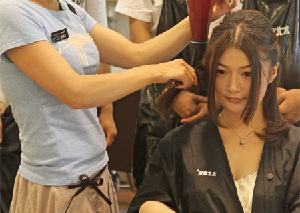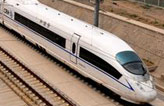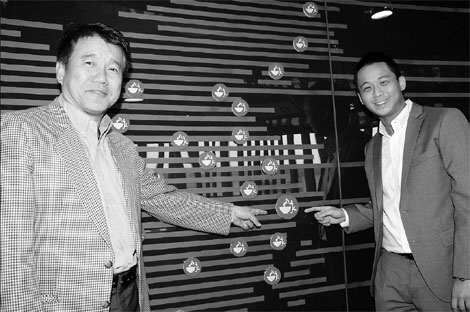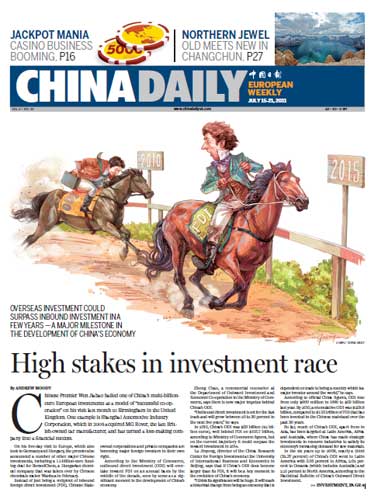Delicacies
New Chinese fast food
Updated: 2011-07-17 08:43
By Tiffany Tan (China Daily)
|
Andrew Tan (left) and Carl Tancaktiong dream of opening up another 500 Yonghe King stores on the Chinese mainland in the next five years. Yong Kai / for China Daily |
How do you capture the palate of a nation of 1.3 billion, especially if you're something of an outsider? Tiffany Tan finds out how Yonghe King has risen to the challenge.
There are more than 200 Yonghe King fast-food stores in almost all of China's first-tier cities, and menu light boxes on the walls are mainly similar, with some regional adaptations. The fast-food chain's senior executives decided to standardize the fast-food chain's menu -except in the south, where it offers richer soups as a concession to local dining habits.
To come up with three soups exclusively for the region, however, the company's "menu team" spent nearly a year trying and discarding recipes as it sought to understand its customers' tastes.
"We found out that their perception of soup is different from ours," says Andrew Tan, 54, president of Yonghe King and a Singaporean Chinese. "They want it cloudy, a lot of meat all broken up. It must taste very strong, like you've boiled it for a long time.
"That's how we came up with those soups - after trial and error for almost nine months," he says with his trademark crackling laughter, during an interview in the company's headquarters in Shanghai.
There were also their two-year-long failed experiments with ice-based desserts inspired by the halo-halo, a colorful snack popular in the Philippines, where Yonghe King's parent corporation is based. (The Singaporean version is called ice kacang.)
"I thought, 'If it's good enough for Singaporeans, if it's good enough for Filipinos, it's good enough for the Chinese,' but it just doesn't work here," says Tan, who worked for McDonald's Singapore and China for 22 years before joining Yonghe King in 2007.
"Why? Because there's a seasonality to the food. It's good only for three, four months. When autumn comes, nobody wants to eat shaved ice. In winter, all the more nobody wants to eat shaved ice."
The experience also emphasized to him the power of color in food.
"The Chinese are very health conscious in terms of preservatives, so they want things to look natural. It failed because we used jelly in pink and green colors That is the biggest lesson I learned."
But Tan and his team seem to be learning their lessons well. They eventually settled on black rice, red bean paste and pudding as desserts.
Meanwhile, in the four years since the Manila-based Jollibee Foods Corporation (JFC) took sole ownership of Yonghe King from Taiwanese shareholders - and hired Tan to head it - the chain has grown from 99 stores in 19 cities to 215 stores in 28 cities.
All branches share branding as well as operating and training systems. Under Tan, Yonghe King also benefited from the experience of Jollibee Foods, which has about 2,300 stores worldwide. The corporation owns six restaurant chains in the Philippines, including Jollibee, which outsells McDonald's and KFC in the country and which now has branches in the US, Brunei and Vietnam.
"We think that a restaurant should deliver the best-tasting product, and this has always been our business philosophy," says Carl Tancaktiong, 31, JFC's restaurant development director for China. "This is the philosophy we try to pass on to anybody who joins the company."
Besides Yonghe King, JFC owns two other Chinese fast-food chains: Hongzhuangyuan, which specializes in congee, and Sanpinwang, which focuses on rice noodles. Apart from Tan and Tancaktiong, JFC has only four other foreign executives in China, all of them Filipinos; the rest of its management and staff are hired on site as it emphasizes "localization".
Yonghe King, which opened its first store in Shanghai in 1995, built its reputation on its fresh soymilk and relatively large youtiao, a deep-fried dough fritter. Now its menu contains some 50 items, including dim sum, noodles and rice dishes, as it seeks to become a dominant, 24-hour dining place. About 135 stores, or almost two-thirds of its branches, operate round-the-clock.
"If you look at China today, most of the leading players are Western fast food China should have huge potential for Chinese fast food, because the Chinese like to eat Chinese food. You can't run away from that."
And so it is that Yonghe King is planning to open 500 more stores on the mainland in the next five years. By next year, it hopes to offer franchises.
When JFC first inked a deal to purchase an 85-percent share of Yonghe King in February 2004, the corporation's president, Tony Tan Caktiong, said he hoped to someday see Yonghe King become "the world's No 1 Chinese-style fast-food brand".
The vision apparently remains.
You can contract the writer at tiffanytan@chinadaily.com.cn.
(China Daily 07/17/2011 page13)
E-paper

The perfect cut
Companies need to revamp, standardize to stave off quality challenges
Crowning achievement
Living happily ever after
Let there be smell
Specials

My China story
Foreign readers are invited to share your China stories.

90th anniversary of the CPC
The Party has been leading the country and people to prosperity.

Setting the pace in Turkey
China is building a 158-km high-speed railway in Turkey.

